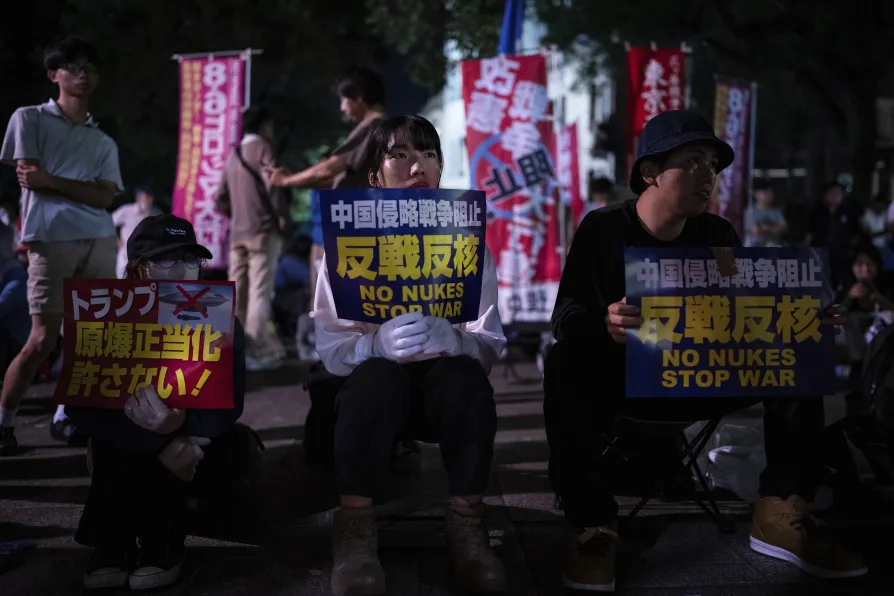
 Protesters sit outside the Atomic Bomb Dome ahead of the memorial service to mark the 80th anniversary of the WWII U.S. atomic bombing in Hiroshima, August 6, 2025, in Japan
Protesters sit outside the Atomic Bomb Dome ahead of the memorial service to mark the 80th anniversary of the WWII U.S. atomic bombing in Hiroshima, August 6, 2025, in Japan
HIROSHIMA marked the 80th anniversary today of the US atomic bombing of the Japanese city, with many ageing survivors expressing frustration about the growing support of global leaders for nuclear weapons.
With the number of survivors rapidly declining and their average age now exceeding 86, the anniversary is considered the last milestone event for many of them.
“There will be nobody left to pass on this sad and painful experience in 10 years or 20 years,” Minoru Suzuto, a 94-year-old survivor, said after he knelt down to pray at the cenotaph.
“That’s why I want to share (my story) as much as I can.”
The bombing of Hiroshima on August 6 1945 destroyed the city and killed 140,000 people.
A second bomb dropped three days later on Nagasaki killed 70,000. Japan surrendered on August 15, ending World War II and Japan’s nearly half-century of aggression in Asia.
Hiroshima mayor Kazumi Matsui warned against a growing acceptance of military build-ups and of using nuclear weapons for national security during Russia’s war in Ukraine and conflicts in the Middle East, with the United States and Russia possessing most of the world’s nuclear warheads.
“These developments flagrantly disregard the lessons the international community should have learned from the tragedies of history,” he said.
“They threaten to topple the peace-building frameworks so many have worked so hard to construct.”
He urged younger generations to recognise that such “misguided policies” could cause “utterly inhumane“ consequences for their future.
“We don’t have much time left, while we face a greater nuclear threat than ever,” said Nihon Hidankyo, a Japanese grassroots survivors organisation that won the Nobel Peace Prize last year for its pursuit of nuclear abolition.
“Our biggest challenge now is to change, even just a little, nuclear weapons states that give us the cold shoulder,” the organisation said in its statement.
About 55,000 people, including representatives from a record 120 countries and regions, including Russia and Belarus, attended the ceremony.
A minute of silence was held while a peace bell rang out at 8.15 am, the time when a US B-29 dropped the bomb on the city.
“There is hope,” UN secretary-general Antonio Guterres said in a statement read by Izumi Nakamitsu, UN under-secretary-general and high representative for disarmament affairs, noting Nihon Hidankyo’s Nobel Peace Prize and countries’ recommitment to a nuclear-free world in “the Pact for the Future” adopted last year.
Mr Guterres stressed the importance of carrying forward the survivors’ testimony and message of peace and added: “Remembering the past is about protecting and building peace today and in the future.”
Near Hiroshima’s iconic Atomic Bomb Dome under high security, more than 200 protesters gathered, holding posters and flags carrying messages such as “No Nuke, Stop War” and “Free Gaza! No more genocide.”
Local police said two people were arrested in separate cases, each on suspicion of assaulting a security guard.

JEREMY CORBYN reports from Hiroshima where he represented CND at the 80th anniversary of the bombing of the city by the US













